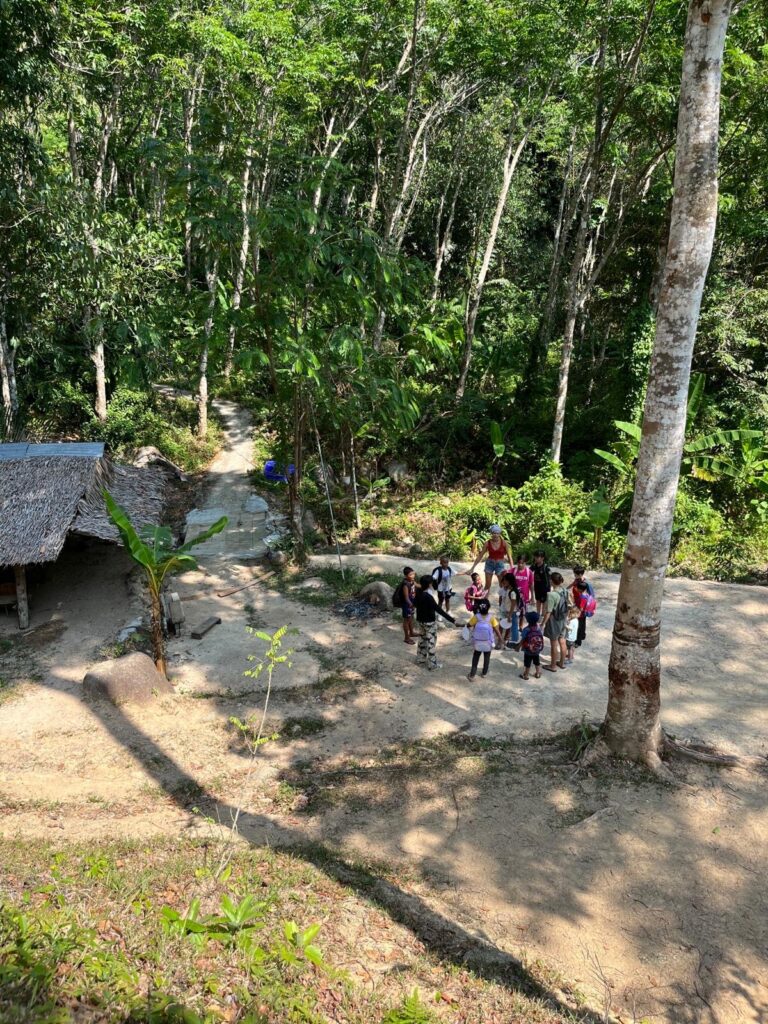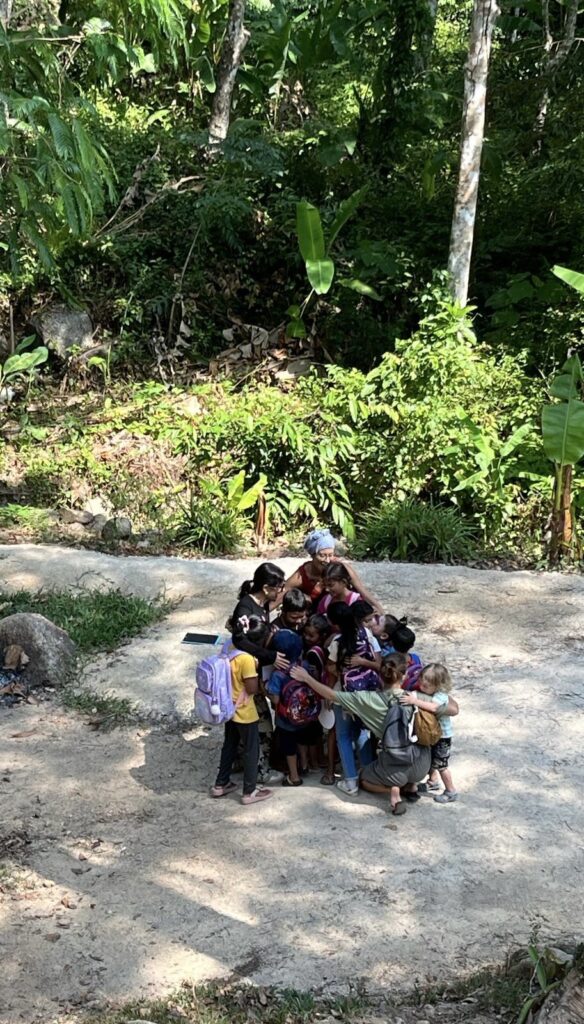The Oak WISP provides holistic education to children in the unique setting of the tropical jungle,en,Being amidst wild nature enlivens the senses,en,engages the imaginative world of a child,en,and allows one to really “breathe”,en,The natural,en,indeed divine,en,order and beauty that exist in nature can ground us and help us to feel,en,It goes without saying that it comes to my mind "the construction of a love" which as he sings immediately after Fossati "breaks the veins of the hands",it,because to build a school it takes a lot of love,it,but a constant that pulsates,it,Sometimes of,it,T23,ar,order and beauty that exist in nature can ground us and help us to feel connected to the world,en,to the earth. ,en,At The Oak,en. Being amidst wild nature enlivens the senses, engages the imaginative world of a child, and allows one to really “breathe”. The natural (indeed divine) order and beauty that exist in nature can ground us and help us to feel connected to the world, to the earth.
At The Oak, we draw from the principles of Waldorf/Steiner education and the Forest School movement,en,Our approach to teaching takes the whole child into consideration,en,for example,en,the child’s “thinking”,en,“feeling” and “willing” are addressed together,en,This means that physical movement,en,practical activities,en,as well as art,en,singing,en,stories or drama,en,form the foundation upon which all academic learning is built,en,In this way,en,a subject is firstly rooted in the child’s imagination,en,it sparks their unique creative capacity,en,perhaps they have even felt it in their limbs and in their environment – then they are able to intellectually approach the subject in an individualised manner,en,to actually gain something from it,en,and hopefully contribute something to it too,en. Our approach to teaching takes the whole child into consideration, for example, the child’s “thinking”, “feeling” and “willing” are addressed together. This means that physical movement & practical activities, as well as art, singing, stories or drama, form the foundation upon which all academic learning is built. In this way, a subject is firstly rooted in the child’s imagination, it sparks their unique creative capacity, perhaps they have even felt it in their limbs and in their environment – then they are able to intellectually approach the subject in an individualised manner, to actually gain something from it, and hopefully contribute something to it too!& Nbsp;
At school we eat fresh organic meals,en,go on lots of nature walks,en,and swim in the jungle’s waterfall pools,en,and occasionally,en,the sea,en,A healthy diet,en,fresh air and enough exercise are healthy for body and soul,en,and help children to learn,en,Activities such as knitting or weaving,en,sewing,en,cooking and working in the garden,en,form an important part of both our primary and preschool curriculum,en,These are not only useful life skills – they help children to develop concentration,en,perseverance,en,problem-solving skills,en,self-esteem and community-spirit,en,and they actually help with cognitive development,en,As Rudolf Steiner said in,en,“The more we take into account that intellect develops from the movement of the limbs,en,from dexterity and skills,en,the better it will be.” ,en,In the preschool,en, go on lots of nature walks, and swim in the jungle’s waterfall pools (and occasionally, the sea). A healthy diet, fresh air and enough exercise are healthy for body and soul, and help children to learn!
Activities such as knitting or weaving, sewing, cooking and working in the garden, form an important part of both our primary and preschool curriculum. These are not only useful life skills – they help children to develop concentration, perseverance, problem-solving skills, self-esteem and community-spirit, and they actually help with cognitive development!
As Rudolf Steiner said in 1920: “The more we take into account that intellect develops from the movement of the limbs, from dexterity and skills, the better it will be.”
In the preschool, the children spend a great deal of time playing freely outdoors,en,discovering butterflies,en,grasshoppers,en,crabs,en,fish in the river,en,fruit trees,en,flowers,en,giant leaves and endless other wonders in the jungle,en,“Nature is the source of wonder,en,and the child should be allowed to experience it without any interference”,en,Rudolf Steiner,en,In the primary school,en,many lessons take place outdoors too,en,We draw lots of inspiration for our work by observing our environment,en,We don’t use textbooks,en,the children take much pride in creating their own beautiful workbooks,en,complete with coloured illustrations and attention to detail,en,This helps them to develop a sense of beauty,en,of mindfulness and care for what they create – and consequently,en,a more personalised interest in the subject of study,en,T21,sl, discovering butterflies, grasshoppers, crabs, fish in the river, fruit trees, flowers, giant leaves and endless other wonders in the jungle!& Nbsp;
“Nature is the source of wonder, and the child should be allowed to experience it without any interference” – Rudolf Steiner.
In the primary school, many lessons take place outdoors too. We draw lots of inspiration for our work by observing our environment. We don’t use textbooks, the children take much pride in creating their own beautiful workbooks, complete with coloured illustrations and attention to detail. This helps them to develop a sense of beauty, of mindfulness and care for what they create – and consequently, a more personalised interest in the subject of study.







Recent Comments